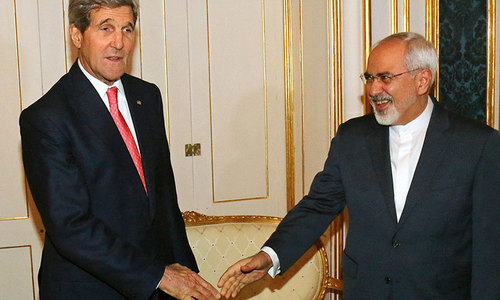WASHINGTON: The United States appears poised to lift at least some sanctions against Iran - possibly as early as January.
US Secretary of State John Kerry said in a letter on Wednesday to the US Senate Foreign Relations Committee that Iran is fulfilling its obligations under the international agreement in what Kerry calls a “transparent” and “verifiable” way, and that “suspension of sanctions is appropriate”.
The committee's top democrat, Senator Ben Cardin, said at a hearing on Thursday that it appears that sanctions relief could start as early as January, not in the spring as initially anticipated.
Also read: United Nations ends decade-long nuclear probe against Iran
Cardin said that throughout the congressional review of the nuclear deal, witnesses for the Obama administration guessed that it would be spring until Iran could comply with the terms required for that relief to begin.
The deal involving the United States, Iran and five other world powers would curb Iran's nuclear activities in exchange for giving Iran access to billions in frozen assets and oil revenue.
“Now we understand it is likely that Iran will be in compliance and entitled to sanctions relief as early as January,” Cardin said at the hearing where administration officials were questioned about the deal.
“Obviously, we want them to comply - don't get me wrong,” Cardin said. “But why did we misjudge so badly the date that is likely for compliance?”
Stephen Mull, the US State Department's lead coordinator for implementation of the deal, agreed that some administration officials had speculated that it would take until the spring. But he said the pacing of compliance is in Iran's hands.
Read more: Iran says it will not accept any missile restrictions
Mull emphasized that the agreement requires Iran to take steps to dismantle its nuclear program correctly, not quickly. He did not speculate about when that would be, and he did not rebut Cardin's claim that it could be next month.
“We're not there yet,” he said. “I don't think anyone in the US can predict when that will be. The responsibility for that lies with Iran as verified by the International Atomic Energy Agency (IAEA).”
Iran's president, Hassan Rouhani, said Wednesday that Iran will carry out its remaining obligations in the next two weeks to pave the way for the lifting of sanctions in January.
He said Iran would now dismantle some nuclear centrifuges and ship out a major portion of its stockpile of enriched uranium.
In Kerry's letter to Congress, which The Associated Press obtained Thursday, he also stated that Iran had not engaged in any covert or other activities that could significantly advance its nuclear weapons program.
Mull said Iran has begun dismantling its uranium enrichment system by removing thousands of centrifuges and transferring them into a storage facility that will be monitored by international nuclear inspectors.
Also read: Iran did work 'relevant' to nuclear bomb until 2003, says UN watchdog
“It has already removed more than 5,000 of its machines and is likely to move quickly to remove the rest in the coming days,” Mull said.
He said Iran is reducing its stockpile of various forms of enriched uranium to no more than 300 kilograms of material enriched up to 3.67 percent.
“It will accomplish this primarily by shipping a significant amount of such material outside Iran, while also diluting the remaining excess to the level of natural uranium or below,” Mull said.
“Commercial contracts are in place for Iran to ship its enriched uranium stockpiles to Russia. We expect that this material - approximately 25,000 pounds of material enriched up to 20 percent low-enriched uranium - could leave Iran in the coming weeks.”
The committee from both parties expressed concern about recent actions taken by Iran, which they fear could foreshadow Iranian noncompliance.
Saying the deal is off to a “terrible start”, republican Senator Bob Corker, the committee chairman, cited Iran's conviction of Jason Rezaian, a Washington Post reporter, along with the export of weapons to Syria and Yemen, and the violation of the UN ballistic missile test ban.
Read more: Iran sentences Washington Post reporter to prison
“Can anyone here point to any substantive consequences that Iran has faced?” Corker said. “We see no evidence of them paying a price for any of these actions. “













































